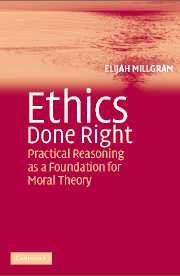Book contents
- Frontmatter
- Contents
- Acknowledgments
- Miscellaneous Frontmatter
- Introduction: The Method of Practical Reasoning
- 1 What's the Use of Utility?
- 2 Mill's Proof of the Principle of Utility
- 3 Does the Categorical Imperative Give Rise to a Contradiction in the Will?
- 4 Reasonably Virtuous
- 5 Murdoch, Practical Reasoning, and Particularism
- 6 Was Hume a Humean?
- 7 Hume on “Is” and “Ought”
- 8 Hume, Political Noncognitivism, and the History of England
- 9 Incommensurability and Practical Reasoning
- 10 Commensurability in Perspective
- 11 Varieties of Practical Reasoning and Varieties of Moral Theory
- References
- Index
1 - What's the Use of Utility?
Published online by Cambridge University Press: 12 November 2009
- Frontmatter
- Contents
- Acknowledgments
- Miscellaneous Frontmatter
- Introduction: The Method of Practical Reasoning
- 1 What's the Use of Utility?
- 2 Mill's Proof of the Principle of Utility
- 3 Does the Categorical Imperative Give Rise to a Contradiction in the Will?
- 4 Reasonably Virtuous
- 5 Murdoch, Practical Reasoning, and Particularism
- 6 Was Hume a Humean?
- 7 Hume on “Is” and “Ought”
- 8 Hume, Political Noncognitivism, and the History of England
- 9 Incommensurability and Practical Reasoning
- 10 Commensurability in Perspective
- 11 Varieties of Practical Reasoning and Varieties of Moral Theory
- References
- Index
Summary
The title of this chapter may sound like a question that doesn't need an answer. Utility is one of those things that is obviously good, just plain intrinsically valuable; good in itself, and not for anything else. On some views, it's the only such thing, and utilitarianism is the natural upshot. I'm going to present arguments against two varieties of utilitarianism, arguments which will put us in a position to advance an answer, or rather, two related answers, to the question: what is the use of utility?
There have been different ways of understanding the notion of utility, and so there have been correspondingly different varieties of utilitarianism in play. I can't (and won't try to) consider all of the many bearers of the name. The two I do want to discuss here are interesting (despite a notable shortfall of adherents) because they are perhaps the clearest expressions of the thought that, it seems to me, moved the better-known utilitarians: that things matter because we have a stake in them, and not the other way around; we do not have a stake in things because they already matter. In trying to make sense of having a stake in something, in a way that could be explanatorily prior to that something's importance, utilitarians came to understand having a stake as psychological, and they went on to look for the classes of mental states in which having a stake consisted. What they found was determined by the available ways of thinking about the mental. Against the background of British Empiricism, nineteenth-century utilitarians took the mattering-making mental states to be pleasure and pain, understood on the model of sensations.
- Type
- Chapter
- Information
- Ethics Done RightPractical Reasoning as a Foundation for Moral Theory, pp. 33 - 55Publisher: Cambridge University PressPrint publication year: 2005



